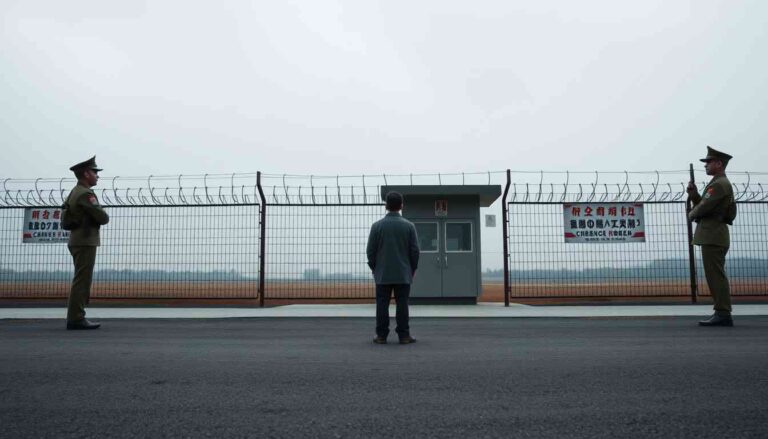Understanding the Restrictions on Travel in North Korea
North Korea, a nation shrouded in secrecy and strict governance, imposes some of the most stringent travel restrictions in the world. For its citizens, the idea of venturing beyond the country’s borders is not just a logistical challenge but a near impossibility. The government tightly controls movement, both within the country and internationally, making it difficult for ordinary people to experience life outside their homeland. This raises the question: can people in North Korea travel freely? The answer is a complex web of rules, surveillance, and consequences that paint a vivid picture of life under one of the most repressive regimes in modern history.
The Role of Government Control in Travel Restrictions
In North Korea, the government plays an omnipresent role in every aspect of life, including travel. Citizens are required to obtain special permits even for domestic travel, and these are granted only under specific circumstances, such as work assignments or family emergencies. International travel is even more restricted, with only a select few – usually high-ranking officials or individuals with special government approval – allowed to leave the country. These individuals are often accompanied by government minders to ensure they do not defect or share sensitive information. The question of whether people in North Korea can travel is not just about logistics; it is deeply tied to the regime’s need to maintain control and prevent exposure to outside influences.
Comparing Travel Freedoms: A Stark Contrast
For those living in countries with open borders, the concept of restricted travel can be difficult to grasp. In nations like the United States, citizens enjoy the freedom to explore the world with minimal barriers. For example, obtaining a visa for US travel is a straightforward process for many, involving clear guidelines and transparent procedures. In stark contrast, North Koreans face a labyrinth of restrictions that make even the thought of international travel seem like an unattainable dream. This disparity highlights the profound impact of governance on personal freedoms and the ability to connect with the world beyond one’s borders.
The Consequences of Unauthorized Travel
Attempting to travel without government approval in North Korea is fraught with danger. Those caught trying to leave the country without permission face severe penalties, including imprisonment, forced labor, and even execution. Families of defectors are often punished as well, facing social ostracism, loss of employment, and relocation to remote areas. These harsh consequences serve as a stark reminder of the risks involved in seeking freedom of movement. The question of whether people in North Korea can travel is not just a matter of policy but a life-or-death decision for those who dare to defy the rules.
The Role of Propaganda in Shaping Perceptions
North Korean propaganda plays a significant role in discouraging travel by portraying the outside world as dangerous and corrupt. Citizens are taught from a young age to view their country as a utopia and to distrust foreign nations. This narrative is reinforced through state-controlled media, education, and cultural programming, creating a psychological barrier that discourages curiosity about the outside world. The question of whether people in North Korea can travel is not just about physical restrictions but also about the mental conditioning that shapes their perceptions of the world beyond their borders.
Exceptions to the Rule: Who Can Travel?
While the majority of North Koreans are unable to travel, there are exceptions to the rule. High-ranking officials, athletes, and artists may be granted permission to travel abroad for official purposes. However, these individuals are carefully vetted and monitored to ensure their loyalty to the regime. Even when abroad, they are often accompanied by government minders who report on their activities and interactions. These exceptions highlight the regime’s selective approach to travel, allowing only those deemed trustworthy to represent the country on the international stage.
The Role of Defectors in Challenging the Status Quo
Despite the risks, some North Koreans have managed to escape the country and share their stories with the world. These defectors provide a rare glimpse into the realities of life in North Korea and the challenges of seeking freedom. Their accounts highlight the lengths to which people will go to escape oppression, from crossing treacherous borders to navigating complex networks of smugglers and safe houses. The question of whether people in North Korea can travel is answered in part by these brave individuals who risk everything for a chance at a better life.
The Impact of International Sanctions on Travel
International sanctions have further complicated the issue of travel for North Koreans. These measures, aimed at pressuring the regime to abandon its nuclear ambitions, have limited the country’s access to foreign currency and resources. As a result, the government has tightened its grip on travel, both to conserve resources and to prevent potential defections. The question of whether people in North Korea can travel is influenced not only by domestic policies but also by the broader geopolitical landscape.
What the Future Holds for Travel in North Korea
The future of travel for North Koreans remains uncertain. While some hope for reforms that will allow greater freedom of movement, others fear that the regime’s grip will only tighten in response to external pressures. The question of whether people in North Korea can travel is a reflection of the broader struggle for human rights and personal freedoms in the country. As the world continues to engage with North Korea, the issue of travel restrictions will remain a key point of contention and a symbol of the challenges faced by its people.
Call to Action: Book a Service to Learn More
If you’re interested in understanding more about the complexities of travel restrictions in North Korea or exploring ways to support human rights initiatives, consider booking a service with experts in international relations and human rights advocacy. Your engagement can make a difference in shedding light on these critical issues and supporting efforts to promote freedom and equality for all.


